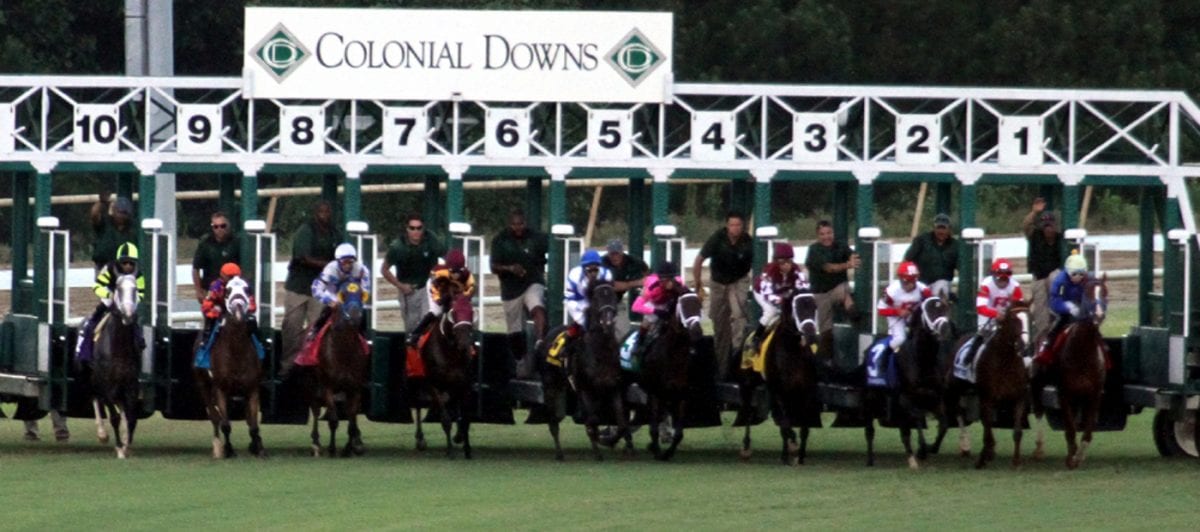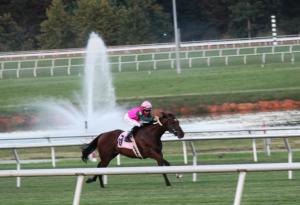by Nick Hahn
[boxify cols_use =”3″ cols =”5″ position =”right” order =”none” box_spacing =”5″ padding =”3″ background_color =”GRAY ” background_opacity =”10″ border_width =”1″ border_color =”blue” border_style =”dashed” height =”625″ ]COMPETING PROPOSALSColonial Downs
- 27 days of live racing
- Flat and jump racing during Dogwood races (early April)
- 3 days over Fathers Day weekend
- 3 days over July 4 weekend
- 6 day, high-end “boutique meet” over first two weekends in September
- 15 additional days in conjunction with harness meet
- Colonial would support using purse funds to run up to 10 additional days at other venues, such as steeplechase meets
- 23 days of live racing
- 11 days run over extended weekends during Dogwood races, Kentucky Derby, Fathers Day, and July 4
- 6 day, high-end “boutique meet” over first two weekends in September
- 3 days during the New Kent County Fair
- Colonial would support using purse funds to run up to 10 additional days at other venues, such as steeplechase meets
Virginia horsemen (most recent)
- 24 days of live racing spread over eight consecutive weekends in June and July[/boxify]In the latest volley of racing date ping pong in Virginia, Colonial Downs has essentially shut off further discussion with the Virginia Horsemen’s Benevolent and Protective Association (HBPA) and called for a new horsemen’s group to help it “build a nationally recognized Virginia Thoroughbred racing brand.”
Colonial asserted those positions in a letter to the HBPA signed by the company’s president, Ian Stewart.
In a follow-up release, Colonial Downs outlined a vision of Virginia’s racing future centered around “a six-day Virginia Derby Festival every September with purses averaging over $500,000 a day.” That vision involves fewer live days with higher purses and better-quality racing.
Noting that the HBPA, the state’s horsemen’s organization, does not share its enthusiasm for what the company terms a “bold paradigm change to high quality Thoroughbred racing in Virginia,” Stewart said in his letter that it “is time for Colonial Downs to move on and work with the thoroughbred horsemen who want to work with us.”
Colonial had previously offered to the horsemen three different scenarios involving a hybrid of higher-end and lower-end racing. There have been several recent exchanges of proposals between the VHPBA, the entity designated to represent Virginia horsemen, and Colonial Downs, which holds Virginia’s sole unlimited racing license, since a stubborn stalemate developed over racing days at the beginning of the year.
The proposals offer a scattered calendar of dates that would allow horsemen to start horses multiple times at Colonial Downs during the summer and fall seasons, an objective of priority for the VHPBA. At the same time, though, they would turn the Colonial meet essentially into a ship-in meet, since the live days would be so widely spaced. Two of three original proposals made in March are revealed in Colonial’s letter, which offer between 23 and 27 days of live racing annually.
What appears to be anchored in each proposal is a mini-boutique meet comprised of three-day racing weekends during the first two weeks in September. Other racing days for lower level racing could occur during the fall harness meet and/or over intermittent weekends throughout the summer, such as Father’s Day weekend, Independence Day weekend and other larger traditional racing days in previous meets at Colonial Downs. Colonial says that it would also support the use of purse money for racing at other venues in Virginia, largely steeplechase meets such as the Gold Cup and International Gold Cup in The Plains.
The VHBPA had countered on March 31st with a proposal that offered eight three-day weekends of racing concluding with a three-day festival of racing with heightened purse levels that would include the Virginia Derby. In his letter, Stewart judges that response “half-hearted and insincere.”
But Frank Petramalo, the Executive Director of the VHPBA, said in an interview Colonial’s proposals are non-starters. The notion of “stacking” the harness and thoroughbred dates — that is, running the meets concurrently — is, he said, “filled with problems.”
“First, the dirt course is unavailable because of its use for harness racing during the meet, which limits training to a few lanes on the turf if there isn’t any inclement weather,” Petramalo pointed out. “Second, there are issues with Thoroughbred horses that arise when the two breeds are integrated, and third the meet overlaps with the Laurel meet, which severely impacts manpower such as the starting gate crew.”
Racing at Colonial Downs for nearly the last decade has been largely comprised of full fields of horses in what Stewart calls “mediocre races,” such as $5,000 claimers or $7,500 maiden claiming races.
Petramalo cites a formula that has been used in the past where accumulated purse money is divided by $200,000 to determine the number of days. Rebates on the 5% commission that the VHPBA receives on wagered dollars have been used to expand off-track facilities and account wagering in Virginia in the past to increase revenue.
Petramalo claims that Colonial has unilaterally changed the standing agreement.
Colonial counters that it was the HBPA’s own actions which created the current impasse. Colonial points to the HBPA’s refusal to accept the Virginia Racing Commission award of a 25-day meet in a five-week structure, a “status quo” of the 2013 summer meet. The 2013 meet offered slightly higher purses but resulted in attendance and handle downturns of nearly 25% each. A Commission-led proposal of a 21-day, seven-week meet was accepted by the VHPBA but declined by Colonial Downs.
In the Colonial letter, the sole track operator in Virginia states that “there is nothing to be gained from further discussion with VHPBA,” and hints of working “with thoroughbred horsemen in Virginia who share our vision.”
The letter alludes to announcements to be made in “the near future.” Those announcements are expected to concern the formation of a new horsemen’s group, currently being organized by Mark Deane. Deane, now affiliated with Colonial Downs, is a former trainer and owner in Virginia and previously was employed by the Virginia Thoroughbred Association in the position of Field Director.
That organization, observers say, could attempt to obtain recognition as being empowered to represent that state’s horsemen, forcing out the HBPA. Were it to succeed in such an effort, the organization would solve one of Colonial’s major problems, a problem which track owner Jeffrey Jacobs acknowledged in the release.
“We recognize that creating a new direction in Virginia Thoroughbred racing without a horsemen’s contract and without the ability to send and receive a racing signal is an uphill battle,” he admitted, “but is a battle worth fighting.”
Perhaps so, but the costs may be high. “There may be no Thoroughbred racing in Virginia for several years,” Jacobs said in the release.
Colonial recently held its Dogwood Races event on April 5th, with an attendance of approximately 3,000 racegoers who wagered an estimated $22,000 over 4 steeplechase races and a training flat.
The question now is whether those will be the only races involving Thoroughbreds to take place in New Kent this year.














I have been a fan of thoroughbred racing since 1990 and have attended the tracks and OTB’s.If there is no contract this year—I believe racing in Virginia is over………….but not to worry…..Charlestown can get my disposable income………..
No more nonsensical offerings from the Colorado-based Jacobs Entertainment, please. Time for the Commonwealth’s governing bodies to revoke Jacobs’ racing license. In Virginia we need a racetrack that supports a Virginia thoroughbred industry, not the Kentucky and New York-based shippers. Todd Pletcher and his cronies should not be delivered all Virginia’s racing on a platter.
hey virginia horseman, your ramblings are the most non-sensical i have heard so far. take away colonials license and give it to who? i am still waiting for you dimwits to produce your long list of investors who want to spend 40 million to build a track for you to run cheap $5000 claimers 5 furlongs for 8 weeks. during colonials race meet last year the martinsville otb couldn’t give away colonials programs! no one wants to bet on small fields of crappy horses! you have had your ignorant bluff called and now you are screwed!
No need for name-calling, H.B.
I have previously mentioned a developing plan for the Commonwealth to sponsor a Keeneland-like 501(c)(3) non-profit that would assume management of Colonial Downs. The charter of the association would be to promote the VIRGINIA thoroughbred industry, rather than be run by out-of-state interests for whom CD is only a plaything intended to allow ADW wagering and OTB parlors.
Discussions in Richmond include taking CD by eminent domain, which would neatly force out the Jacobs clan, under whose “stewardship” the track has gone from a robust summer schedule to…… nothing.
As I have said many times before, both sides are at fault here and that is why some kind of compromise is needed. And, a little honesty would not hurt. Anyone who has frequently visited Colonial Downs live track and OTBs over the years knows that current ownership has been responsible for the massive deterioration of the horse racing product in Virginia. For them to sell us on “We want to improve the quality of racing in Virginia” is sort of like Satan saying he would like to promote God and religion. Colonial Downs management is forced to sell the Jacobs ownership company line because they have no other choice. For them , it is all about what can we cut back on next. Everything else has been cut to the bare bones, so live racing is the next victim. On the other hand, the Horsemen must realize they are fighting a battle they can’t win. Having low-level claiming horses compete in your own back yard playground may be fun for you but it certainly is not for bettors who would like to see better racing. It’s time for a little honesty from both sides. A little honesty always leads to compromise!
Now that was honest and a fair look at both sides’ viewpoints. CD needs live racing in order to have the OTBs and over time, most money will flow from the Account Betting. Why not three days a week for five weeks from late June to the end of July (get a big Opening day and the July 4 weekend….summer vacationers when racing is not ongoing in MD) and then 5 days of “boutique racing” the first 2 weeks of September. In five weeks, some horses can run at least twice if not 3x, and some can hold over from the end of July to the first week of September (the boutique meet is still going to have some lower level races) for a third or fourth race. 20 days total; good purse averages per day; some level of convenience to the horsemen. Like you said, we can’t limit racing to the ’boutique meet’ nor can we run crap that no one cares about.
Not likely. Racing is DONE for 2014 and probably for forever. It cost too much to put on a race meet where 1,000 people show up for the races. The money is in Account Betting where the overhead is much less. the long history and tradition of Virginia Racing is DONE…OVER..A THING OF THE PAST. The State will get money off Account Bets off races somewhere else…NY, Fla, Ky, but don’t cry for Colonial Downs…the location (horrible) and a lack of genuine desire to promote Va racing did it in long ago. Let the bulldozers in and the commercial developments begin. Sad, but true.
so let me see if i have this right. if someone refuses to use their rightfully owned, bought and paid for private property the way you wish then you feel that you have the right to confiscate it. if this is to become the accepted political philosphy in this country then america has no future, and all virginia property owners should be very afraid!
H.B., your complaint is with the Founding Fathers. They wrote in the Fifth Amendment to the Constitution that private property may be taken by the government, so long as “just compensation” is paid. Eminent domain is not “confiscation,” as you call it.
Right now, Colonial Downs is shut down as a business enterprise, by Jacobs’ own admission there is not likely to be racing there for many years. The just compensation for the taking of the property will therefore be rather lower than were the track an actually-functioning business like Laurel Park or Keeneland.